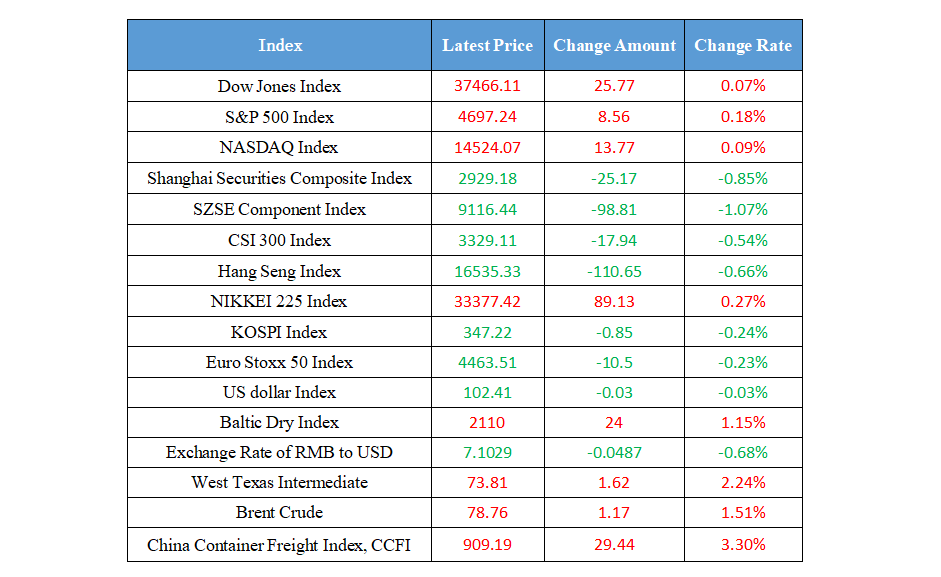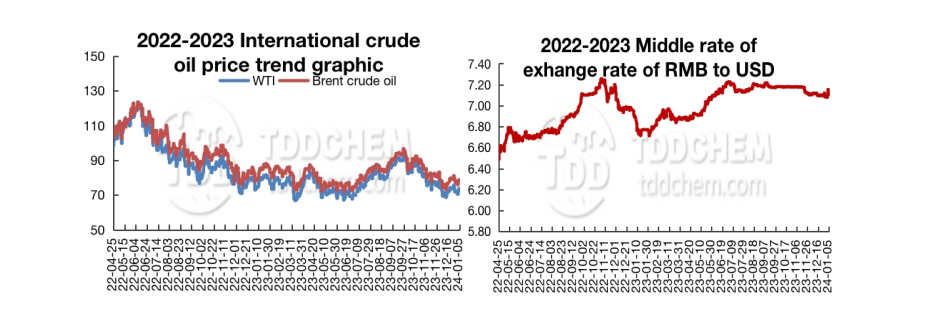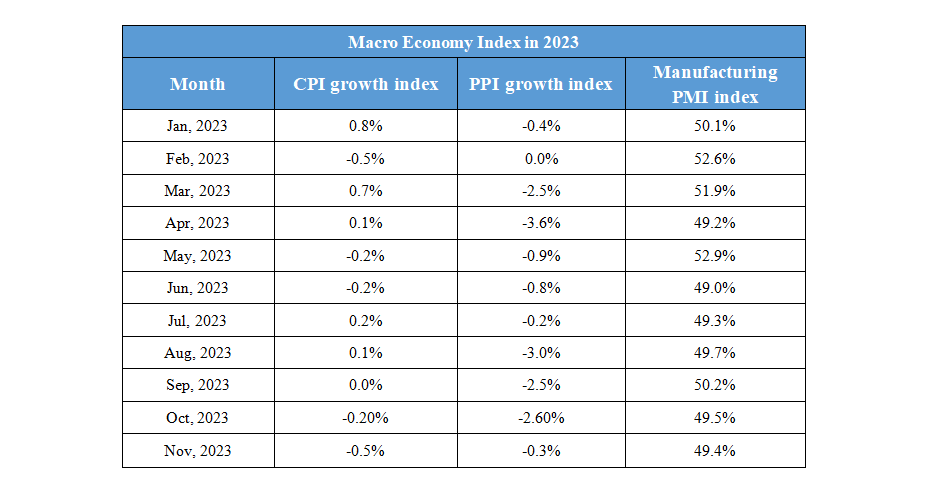January 6th, Domestic and International Macro Economic Highlights
Daily Macro Economy News
Latest Global Major Index

International Crude Price Trend and Exchange Rate of RMB to USD Trend

Domestic News
1. In December last year, China's commodity supply and demand maintained an upward trend and the growth rate slowed down
2. Ning Jizhe: Strengthen counter-cyclical adjustment and make good use of fiscal policy
3. China's third-generation autonomous superconducting quantum computer "Origin Wukong" was launched today
4. Heilongjiang: By 2025, the proportion of coal consumption in the province will drop to about 60%
International News
1. Boosted by the rebound in fuel oil exports, Russia's exports of petroleum products hit an eight-month high
2. Germany has made progress on the road to energy transition, and the proportion of clean energy has reached a new high
3. The global manufacturing purchasing managers' index for December 2023 was announced, and the global economic recovery momentum continued to weaken
4. Goldman Sachs: There is upside potential in the EPS forecast of the S&P 500 index
Domestic News
1. In December last year, China's commodity supply and demand maintained an upward trend and the growth rate slowed down
The China Federation of Logistics and Purchasing (5th, Jan) announced the China Commodity Index for December 2023. Judging from the changes in the index, the supply and sales of bulk commodities have maintained an upward trend, but the growth rate has slowed down. On the whole, the current domestic commodity market supply is loose, and the market inventory is reduced as a whole. In December 2023, China's commodity index was 100.7%, down 0.6 percentage points from the previous month. The sub-index shows that supply and sales have maintained an upward trend, of which the increase in supply has narrowed, the sales growth rate has rebounded slightly, and the inventory has shown a downward trend.
2. Ning Jizhe: Strengthen counter-cyclical adjustment and make good use of fiscal policy
On January 6, Ning Jizhe, deputy director of the Economic Committee of the National Committee of the Chinese People's Political Consultative Conference (CPPCC) and vice chairman of the China Center for International Economic Exchanges, said in his opening speech at the 28th (2024) China Capital Market Forum that macroeconomic regulation and control should be strengthened in 2024 to provide policy support for consolidating and developing the upward trend of economic recovery. The direction of macroeconomic regulation and control is to strengthen counter-cyclical adjustment, continue to implement a proactive fiscal policy and a prudent monetary policy, and the intensity of macroeconomic regulation and control will inevitably increase. Make good use of the space of fiscal policy, and there are many tools in the fiscal policy toolbox, for example, increase the scale of fiscal expenditure, increase the amount of local government special bonds, and increase the scale of budgetary investment.
3. China's third-generation autonomous superconducting quantum computer "Origin Wukong" was launched today
The reporter learned from the Anhui Provincial Quantum Computing Engineering Research Center and the Anhui Provincial Key Laboratory of Quantum Computing Chips that China's third-generation independent superconducting quantum computer "Origin Wukong" was launched at 9 o'clock today. The quantum computer is equipped with a 72-bit autonomous superconducting quantum chip "Wukong Core", which is currently the most advanced programmable and deliverable superconducting quantum computer in China.
4. Heilongjiang: By 2025, the proportion of coal consumption in the province will drop to about 60%
The Heilongjiang Provincial People's Government issued the "Heilongjiang Provincial Implementation Plan for Air Quality Continuous Improvement Action Plan", which mentioned that new steel production capacity is strictly prohibited. Strictly implement the national iron and steel capacity replacement measures, promote the integrated layout of steel, coking and sintering, reduce independent coking, sintering, pelletizing and hot rolling enterprises and processes, eliminate backward coal washing capacity, and guide and promote the transformation of blast furnace-converter long-process steelmaking to electric furnace short-process steelmaking according to national requirements. Strictly control the total amount of coal consumption. By 2025, the proportion of coal consumption in the province will drop to about 60%.
International News
1. Boosted by the rebound in fuel oil exports, Russia's exports of petroleum products hit an eight-month high
The four-week average of Russian oil product exports climbed to their highest level since April last year, boosted by a sharp rebound in fuel oil exports. Refined fuel flows averaged nearly 2.7 million barrels per day in the four weeks until Dec. 31, an increase of about 152,000 barrels, or 6%, from the previous statistical period, according to analyst firm Vortexa. In the last week of December, volatile weekly flows edged up to 2.6 million b/d. Diesel and gasoline exports fell about 4% from the previous week to a three-week low of 1.14 million barrels per day. Still, total exports in December, which were around 1.17 million barrels per day, were the highest last year, thanks to the easing of diesel export restrictions and the recovery of Black Sea Port from the storm.
2. Germany has made progress on the road to energy transition, and the proportion of clean energy has reached a new high
In 2023, clean energy accounted for a record 56% of Germany's electricity generation, while total emissions from the power sector fell by more than 20% from 2022 levels, falling to their lowest level in decade, according to think tank Ember. Coal-fired power generation fell by almost 30%, while electricity generation from all fossil fuels fell by more than 20%. Continued production cuts in several key sectors, especially in the chemical and fertilizer sectors, could improve Germany's electricity situation in 2023 by cutting electricity consumption in traditionally energy-intensive industries. More realistic feedback on Germany's energy transition momentum is likely to emerge in 2024 as new fixed-cost agreements for enterprises begin to implement and potentially boost the country's total electricity demand.
3. The global manufacturing purchasing managers' index for December 2023 was announced, and the global economic recovery momentum continued to weaken
The China Federation of Logistics and Purchasing announced today (6th) the global manufacturing purchasing managers' index for December 2023. The index was unchanged from the previous month, and has been running below 50% for 15 consecutive months, indicating that the stability of the global economic recovery is weak and the recovery momentum is insufficient. The global manufacturing purchasing managers' index was 48% in December 2023, unchanged from the previous month and running below 50% for 15 consecutive months. In 2023, the global manufacturing purchasing managers' index will average 48.5%, down 3.3 percentage points from 2022, an ran below 50% in each month of the year, and the global economic growth momentum will slow down compared with 2022.
4. Goldman Sachs: There is upside potential in the EPS forecast of the S&P 500 index
The strong U.S. economy is one of the factors that could help U.S. corporate earnings beat current expectations. Goldman Sachs strategists forecast earnings per share for S&P 500 companies to rise 5% to $237 in 2023. That's already higher than the median forecast of $231 for institutional tracked strategists, and Goldman Sachs believes there are a number of factors that could help companies generate earnings more than that figure heading into the fourth-quarter financial report. “Despite the decline in oil prices, we believe that stronger U.S. economic growth, lower interest rates and a weaker U.S. dollar could be the upside potential for our EPS expectations.”
Domestic Macro Economy Index














